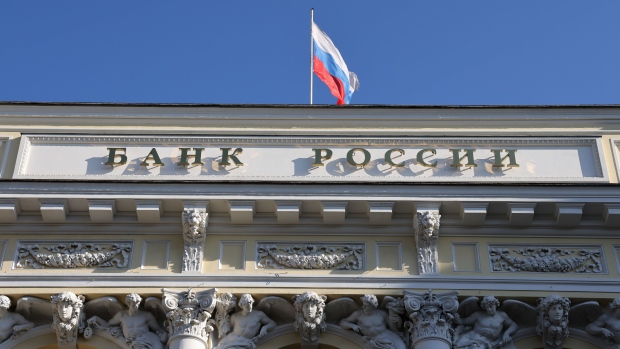Aug 10, 2022
Barclays, Jefferies Are Among Firms Brokering Trades of Ruble Bonds
, Bloomberg News

(Bloomberg) -- Barclays Plc and Jefferies Financial Group Inc. are among firms facilitating a sudden uptick in trading in the Russian government’s local-currency bonds.
The financial institutions have been offering bids in the region of 20-25 kopecks on the ruble, according to people familiar with the matter, who declined to be identified because the information is private. In Moscow, the bonds trade at about 90% of face value, according to data from the Moscow exchange.
“We are working within global sanctions guidelines to facilitate our clients’ needs to navigate this complicated situation,” a spokesperson for Jefferies said in an emailed response to questions. “Our motto is Clients First, Always.”
Barclays representatives declined to comment when contacted by Bloomberg.
Sweeping international sanctions since Russia’s invasion of Ukraine have created a bifurcated market for the notes, which were once a popular part of emerging-market investors’ portfolios. Myriad restrictions block foreigners from receiving coupons and principal on the so-called OFZ bonds, but inside the country local investors can receive payments, and the notes are still in demand.
After dropping in the wake of the invasion, foreigners’ share of the OFZ market has held steady and was at 17.6%, or 2.8 trillion rubles ($46 billion) as of July 1, according to Russian central bank data.
OFAC License
It’s unclear what drove the recent uptick in trading, but the timing coincides with a general license issued by the US Treasury’s Office for Foreign Assets Control in late July authorizing transactions through Oct. 20 aimed at winding up Russian debt or equity trades that were made to June 6.
That means US investors could purchase Russian sovereign bonds if they need to unwind a short position, for instance.
“In our experience, intermediaries that were previously somewhat hesitant to engage in closeout-related transactions now accept that it’s clear,” said Paul Marquardt, a partner at law firm Davis Polk & Wardwell.
Bloomberg previously reported that investment bank and brokerage firm Seaport Global LLC was buying local currency Russian government bonds. Seaport Global did not respond immediately to an emailed request for comment on Wednesday.
Yields on Russia’s 10-year ruble notes fell 30 basis points in the local market between July 18 and the end of the month, and have traded around that level since, the Moscow exchange data show.
(Updates with comment from lawyer in ninth paragraph.)
©2022 Bloomberg L.P.





